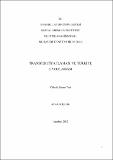Please use this identifier to cite or link to this item:
http://hdl.handle.net/11547/1718Full metadata record
| DC Field | Value | Language |
|---|---|---|
| dc.contributor.author | Diliçıkık, Ata | - |
| dc.date.accessioned | 2019-05-06T11:53:26Z | - |
| dc.date.available | 2019-05-06T11:53:26Z | - |
| dc.date.issued | 2012 | - |
| dc.identifier.uri | http://hdl.handle.net/11547/1718 | - |
| dc.description.abstract | Transfer fiyatlandırması, dünya ekonomisinin bütünleşmesi, küreselleşme olgusunun hızla artması ve ülkeler arasındaki ticaret hacminin genişlemesi sonucunda, en önemli vergi konusu olarak gündemdeki yerini almıştır. Türkiye’de “Transfer Fiyatlandırması Yoluyla Örtülü Kazanç Dağıtımı” 5520 sayılı Kurumlar Vergisi Kanunu’nun 13. maddesi ile 1 Ocak 2007 tarihinde yürürlüğe girmiştir. Bu düzenlemeye göre, kurumların ilişkili kişilerle emsallere uygunluk ilkesine aykırı olarak tespit ettikleri bedeller ile mal veya hizmet alım ya da satımında bulunması durumunda, kazanç transfer fiyatlandırması yoluyla örtülü olarak dağıtılmış sayılmaktadır. Genel olarak transfer fiyatlandırması kuralları OECD Transfer Fiyatlandırması Rehberi örnek alınarak düzenlenmiştir. Bu çalışmada, transfer fiyatlandırması konusu Kurumlar Vergisi Kanunu, OECD normları ve diğer kanunlar çerçevesinde pozitif ve negatif yönleri ile birlikte ayrıntılı olarak incelenmiştir. Mevcut transfer fiyatlandırması düzenlemesi ile Türk Vergi Sisteminin özellikle OECD Transfer Fiyatlandırması Rehberi ve uluslararası gelişmelere uygun bir yapıya kavuştuğu sonucuna varılmıştır. | tr_TR |
| dc.language.iso | tr | tr_TR |
| dc.publisher | İSTANBUL AYDIN ÜNİVERSİTESİ SOSYAL BİLİMLER ENSTİTÜSÜ | tr_TR |
| dc.subject | Transfer Fiyatlandırması | tr_TR |
| dc.subject | Örtülü Kazanç Dağıtımı | tr_TR |
| dc.subject | Emsallere Uygunluk İlkesi | tr_TR |
| dc.subject | Muhasebe | tr_TR |
| dc.subject | Vergi | tr_TR |
| dc.subject | Transfer Pricing | tr_TR |
| dc.subject | Disguised Profit Distribution | tr_TR |
| dc.subject | Arm’s Length Principle | tr_TR |
| dc.subject | Accounting | tr_TR |
| dc.subject | Tax | tr_TR |
| dc.title | TRANSFER FİYATLAMASI VE TÜRKİYE UYGULAMASI | tr_TR |
| dc.type | Thesis | tr_TR |
| dc.description.abstractol | Transfer pricing, has become the most important tax issue as a result of integration of world economy, deepening globalalization an expantion of international trade volume. January 1st, 2007 marks the beginning of formal transfer pricing practice in Turkey by the way of article 13 of Turkish Corporate Tax Law (numbered 5520) under the title “Disguised Income Distribution Through Transfer Pricing.” According to Article 13 of the Law, If a taxpayer enters into transactions regarding sale or purchase of goods and services with related parties, where the prices are not set in accordance with the arm’s length principle, then related profits are considered to be distributed in a disguised manner through transfer pricing. Turkish transfer pricing rules are mainly based on the OECD Transfer Pricing Guidelines. In this study we discussed transfer pricing from both positive and negative perspectitives within the framework of Corporate Income Tax Law, the OECD regulations, and other related laws. The study concludes that the current transfer pricing regulations are prepared by taking into account international developments and particulary the OECD Transfer Pricing Guidelines. | tr_TR |
| dc.publisher.firstpagenumber | 1 | tr_TR |
| dc.publisher.lastpagenumber | 186 | tr_TR |
| dc.identifier.bibliographictag | DİLİÇIKIK Ata, Transfer Fiyatlaması ve Türkiye Uygulaması, Yüksek Lisans Tezi, İstanbul, 2012 | tr_TR |
| Appears in Collections: | Tezler -- Thesis | |
Files in This Item:
| File | Description | Size | Format | |
|---|---|---|---|---|
| 331118.pdf | Tez Dosyası | 1.41 MB | Adobe PDF |  View/Open |
Items in DSpace are protected by copyright, with all rights reserved, unless otherwise indicated.
